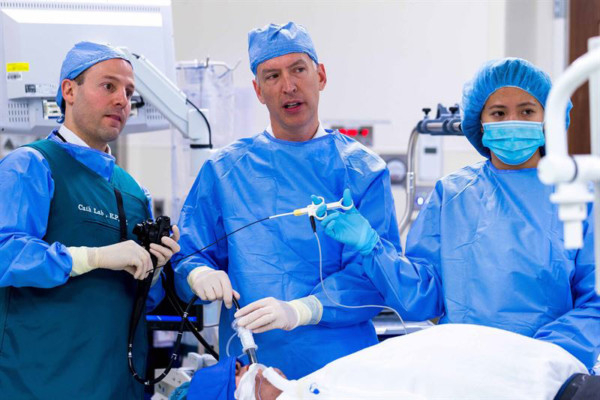
Dubai: Non-invasive endoscopic procedures to fit new devices to combat diabetes and obesity will be introduced at the Cleveland Clinic Abu Dhabi by 2019.
Dr Matthew Kroh, chairman of the Digestive Institute at the Cleveland Clinic, Abu Dhabi shared some of the innovative procedures that are already in use in Europe and US and might be available soon in the UAE.
Dr Kroh spoke to Gulf News on the sidelines of the concluding day of the four-day Arab Health 2018 congress.
“Obesity comes with a host of co-morbidities such as diabetes, hypertension, hyperlipidemia, fatty liver and diabetes in turn leads to retinopathy, neuropathy and kidney disease. Sometimes losing weight and exercise do not help solve the problem and it is then that simple endoscopic procedures to implant devices that delay digestion or sugar absorption help greatly in reducing a person’s appetite and glucose metabolism,” said Dr Kroh.
Dr Kroh added that in studies carried out in three centres in Europe, US and South America where 200 patients had these procedures or devices planted, nearly all of them lost approximately 10 per cent of their body weight. “In cases like this it is not just the question of weight, but along with it a patient also loses the quality and the length of his life by helping bring down high blood glucose and cure other co morbidities.
He enumerated some of the new techniques that are being practised. Currently, Cleveland Clinic Abu Dhabi, offers the sleeve gastroplasty where suturing tube introduced through the oral mouth cavity stitches the stomach wall to reduce its size and thereby the intake of food.
“It also slows down digestion which makes the individual feel less hungry as there is feeling of fullness,” Dr Kroh said.
Other innovations listed by Dr Kroh included liners that decrease absorption from the small intestine, and devices that affect receptors for the hormone grehlin, which helps regulate appetite and also the distribution and rate of use of energy.
Dr Nadia Ahmad, founding director of the Obesity Medicine Institute in Dubai, and senior adviser on obesity solution at Johnson Medical Devices, Middle East held a webinar on unlocking mysteries of metabolism wherein she stated it was time to think out of the box to combat metabolism.
She pointed out that despite global efforts to stem the obesity epidemic, no country has succeeded in decreasing obesity in the last 33 years.
OBESITY FIGURES
Worldwide obesity has more than doubled since 1980, with almost 30 of the population continued to overweight or obese. In UAE alone nearly 31.7 per cent people are obese and over 67 per cent of the total population is overweight according to the latest data of the World Health Organisation (WHO).
Dr Ahmad said: “Measures to introduce healthier food options at schools, to tax sugary drinks and to encourage people to exercise are all important steps towards promoting a healthy lifestyle, but some individuals still struggle to lose weight based on lifestyle modification alone and may require pharmacotherapy and metabolic surgery.”
Environmental, social, dietary factors and aspects relating to common medications, stress and sleep can all play a role so there is no ‘one size fits all’ approach to combating obesity, she added.
People need to shed their bias against overweight and obese people, come together and work differently to break the stalemate, she said.
Figures released by WHO in 2016
Obesity in the UAE adult population: 31.7%
Obesity in adult males: 27.4 %
Obesity in adult females: 37%
Obesity in children in age group of 5-14 years: 17.3%
Share of overweight adults in population: 67.8%
Share of overweight adult males in population: 66.3%,
Share of overweight adult females: 77%
Share of overweight children in age group of 5-14 years: 35.8%













